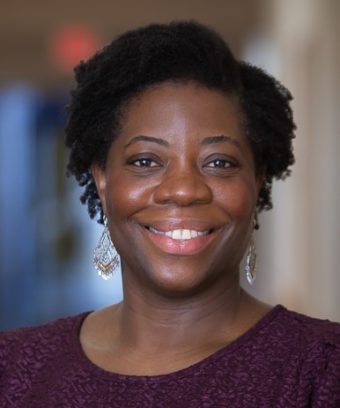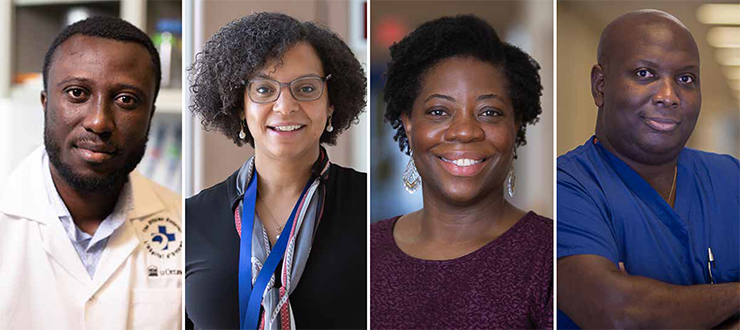
This year, we are celebrating Black staff and physicians at The Ottawa Hospital who have made history in their fields, breaking down barriers and laying the groundwork for others to follow. Meet some of these inspirational trailblazers, and learn about their remarkable achievements.
The Ottawa Hospital is proud to celebrate Black History Month 2022. This year’s theme is “February and forever: Celebrating Black history today and every day.” This theme acknowledges that although Black History Month is celebrated in the month of February, this is not the only time to acknowledge Black history or the contributions of Black Canadians.
Ellen Odai Alie, Director of Medical Imaging
The first Black occupational therapy graduate from Queen’s University
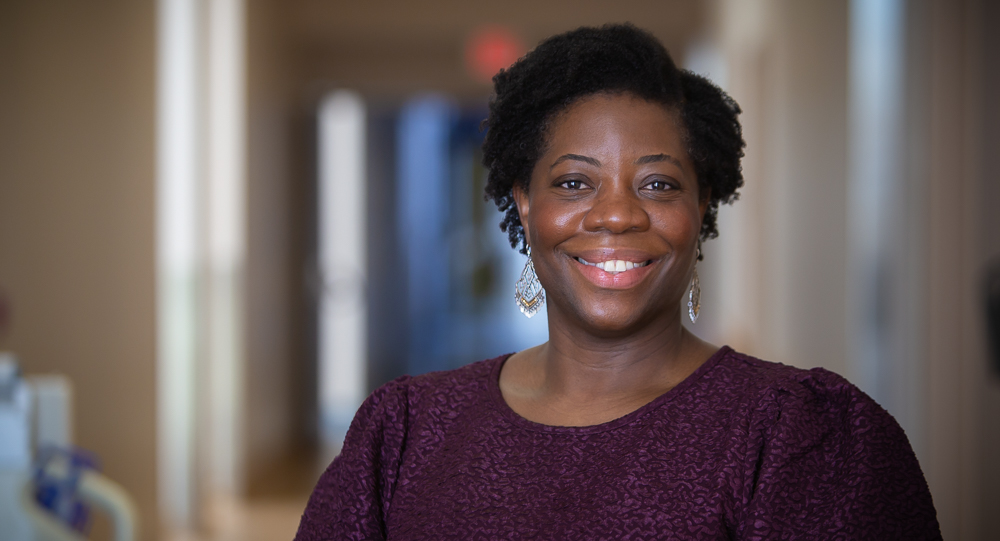
Ellen Odai Alie joined The Ottawa Hospital in 2002. To help start a broader conversation about inequalities in the health-care system, she founded the Healthy Conversations Series of panel discussions featuring staff and physicians at the hospital. Ellen holds the distinction of being the first Black occupational therapy graduate from Queen’s University.
“The Queen’s University Occupational Therapy program was established in 1967; 35 years later, I became its first Black graduate. When reflecting on my experience at Queen’s, I remember a time of learning and discovery. I also remember instances where I felt that I did not quite belong,” recalls Ellen.
“I have a distinct memory of walking through the halls in my first year, looking at the pictures of each graduating class. As I looked at the rows and rows of faces, it struck me that all the people who came before me looked nothing like me. This is my reality; I am often the only Black person or one of a few Black people in my workspaces. However, this does not discourage me. In fact, it further motivates me as I progress in my career and strive to achieve my professional and personal goals.
“I share my story because I hope young Black people—particularly those who may not yet see themselves reflected in university halls, hospital leadership or any other arena—will know that they can find a path to reach their goals and that it is possible to achieve their dreams.”
Dr. Janine Malcolm, Endocrinologist
One of the first Black females to graduate from the Queen’s University School of Medicine
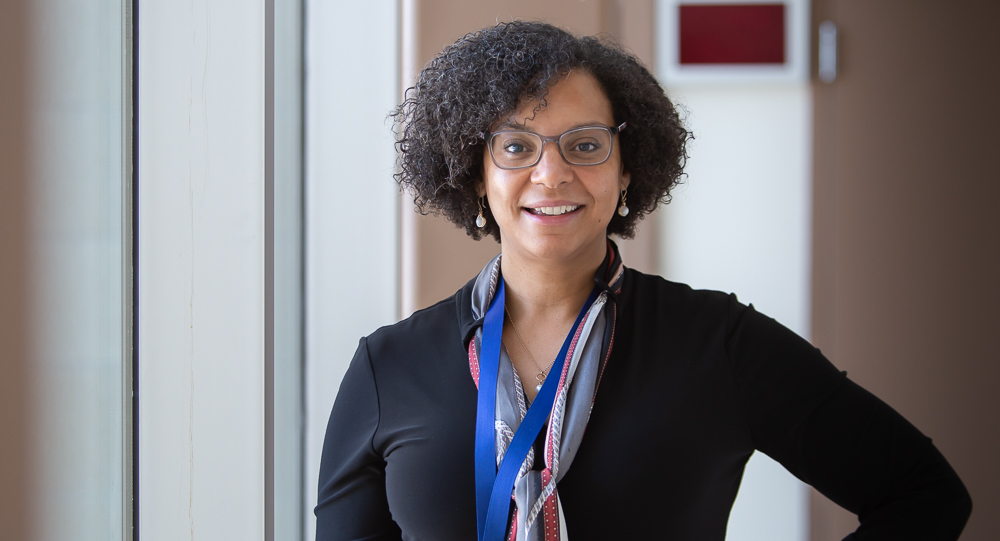
Raised in Ottawa, Dr. Janine Malcolm knew from a young age that she wanted to pursue a career in medicine. Today, she is an endocrinologist at The Ottawa Hospital’s Foustanellas Endocrine & Diabetes Centre and is one of the lead authors on the Canadian guidelines for management of diabetes. A first-generation Canadian, Dr. Malcolm is one of the first Black females to graduate from the Queen’s University School of Medicine.
“I never really thought much about being a first until recently,” says Dr. Malcolm. “I think, for me, being a first represents possibility and hope. Representation is so important—it allows people to envision goals that they may not have considered before. To be honest, it never really occurred to me that I couldn’t do something if I really wanted to. I just set my sights on a goal and went for it. But not having teachers, mentors or leaders that looked like me made it a lot more challenging. I hope that by seeing that I was able to achieve my goals, others like me will think it is possible for them, too.”
Dr. Alfredo E Walker, Forensic Pathologist
The first Black forensic pathologist on the Home Secretary’s Register of Forensic Pathologists for England and Wales
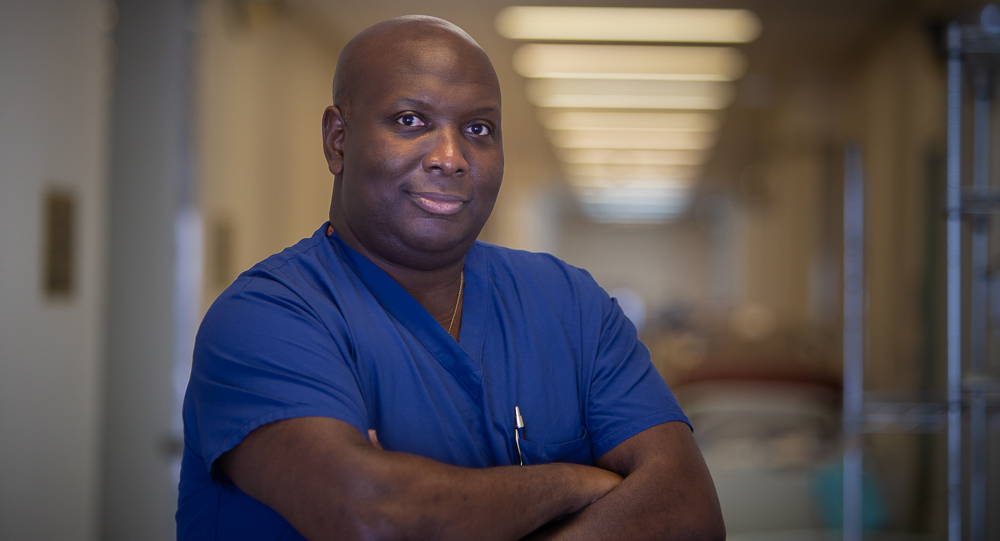
Originally from Trinidad and Tobago, Dr. Alfredo E Walker graduated from the University of the West Indies medical school before migrating to the United Kingdom to pursue postgraduate training in both anatomical pathology and forensic pathology. He became the first (and only) Black forensic pathologist to be placed on the Home Secretary’s Register of Forensic Pathologists for England and Wales since its establishment in 1991. A forensic pathologist/coroner at The Ottawa Hospital since 2011, he is one of only three Black forensic pathologists in all of Canada and is both Vice Chair and Director of Education of the Department of Pathology and Laboratory Medicine (PALM) of the Faculty of Medicine.
“Coming from very humble beginnings, I consider myself very blessed to be the first and only Black person to qualify as a forensic pathologist in England and Wales and have had my name entered on the Home Secretary’s Register of Forensic Pathologists since its establishment in 1991,” says Dr. Walker.
“Although this can be perceived as a personal accomplishment, this achievement is much greater than me, and so I see myself as an example of what is possible for visible minorities. In that regard, my career has been shaped around mentoring others to aspire towards achieving their professional goals, no matter how daunting the journey may seem, and to achieve self-actualization. ‘To whom much is given, much is expected.’ In this regard, I use this statement to guide my outreach and mentoring activities of undergraduate, medical and postgraduate students. My career was shaped without the benefit of a real mentorship, and so I try my best to support and mentor those who would like to follow in my professional footsteps so that their academic and professional pursuits aimed at achieving the same goals can be informed and deliberate. This is not a responsibility that I take lightly, and so I do all within my power to be an ambassador.”
Dr. Meshach Asare-Werehene, Immuno-Oncology Researcher and Part-Time Professor
The first Black recipient of the Dr. Ronald G. Worton Researcher in Training Award
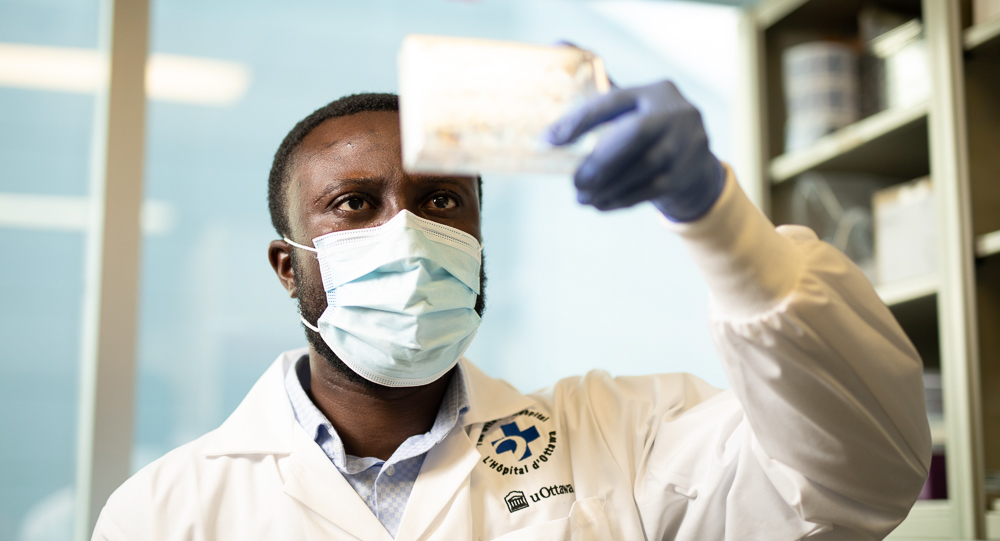
Dr. Meshach Asare-Werehene has come a long way to get to where he is today (literally), moving from Ghana to the United Kingdom and then Canada as well as spending some time in Japan. He is the only Black person at The Ottawa Hospital with advanced training in immuno-oncology, a field that keeps transforming cancer treatment and improving patient survival. Recently, he became the first Black recipient of the Dr. Ronald G. Worton Researcher in Training Award for his groundbreaking ovarian cancer research.
“When I think about these great achievements and others, I question ‘why now?’ Why hasn’t any other Black person achieved this? Then I realize that that’s why I am here,” says Dr. Asare-Werehene. “Professionally, it inspires me to continually push the boundaries and do the best I can for patients waiting for alternative diagnostics and treatments. Personally, this goes beyond individual achievement. It is for the Black child waiting to be motivated by another Black person in a white coat. It is difficult to become something when there is no one like you to look up to, which has been my case throughout my clinical and research journey. I’m excited that generations coming after me will see the path created and can say ‘Meshach was there, hence we can also be there and beyond.’ This is the joy of being the ‘first.’ However, I don’t want to be the ‘only.’ I want to see more Black people in white coats on the bench and at the bed side.”
To learn more about Dr. Meshach Asare-Werehene, his background and his research, read his Q&A with The Ottawa Hospital Foundation.
Source: The Ottawa Hospital

